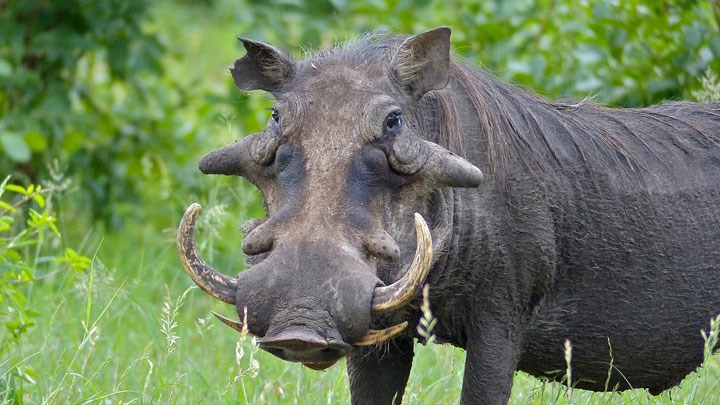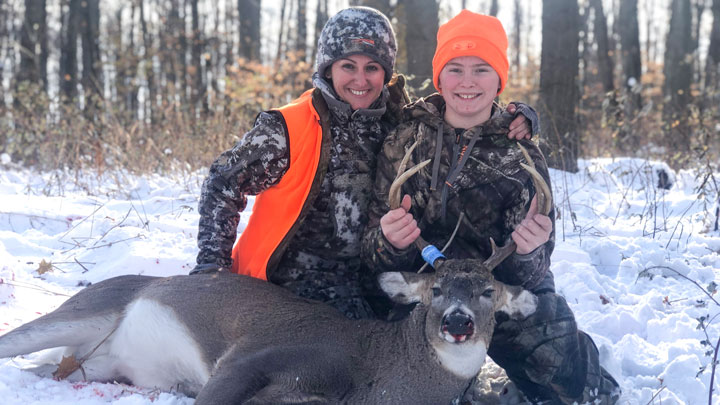
by Andrea Bogard - Monday, August 10, 2020

I went to Africa on a hunting trip last August. In the days and weeks leading up to that grand adventure, I posted daily on social media about my preparations for my trip. One of my Facebook connections commented, “What could you possibly be hunting in Africa? When we were there, there were no animals left!” Another connection said, “That’s so sad; why would you want to shoot things from “The Lion King?”
My first impression was to respond, but my final response was to ignore them. In the case of the first comment, I couldn’t come up with a response that would be gentle, professional or gracious that wouldn’t spark additional conflict. The other comment was more complex. I have been trying for months to put together a timeline of when I knowingly transitioned from calling myself a hunter to identifying as a conservationist. What even is a conservationist?
This journey of understanding is definitely not a straight shot. There’s a bit of drop and windage involved. Just when I think I’ve got a handle on it, I catch a gust of new information and my trajectory changes. I hold into the wind a bit to find my new zero and learn that the whole game has changed.
So, ballistics metaphors aside, what is conservation? Honestly, it isn’t a hunter/anti-hunter/non-hunter discussion. It needs to be a human-to-human understanding. We need to agree, as human beings, to work together from our various viewpoints and to create a balance of habitat, resources and animals to maintain the healthiest equilibrium for the world we have been given.
We need checks and balances to maintain that equilibrium. Conservation is the balance needed, but there are different approaches to it. As this website reported last summer, Ann Arbor, Mich., thought a good method of reducing the problematic deer population was to sterilize does so they couldn’t reproduce. Now there are huge personnel and medical costs coupled with the infection risk associated with no post-op care. In addition, when that doe gets smoked by a car on the expressway, the insurance company pays for the accident as well as the state of Michigan for the previous costs to sterilize that deer. Typically, no one will eat or use that deer in any way. This isn’t conservation; this is waste.
Getting back to my recent trip to Africa, while in Namibia I witnessed the death of wildlife as I never had before because of the country’s terrible draught. Countless wildlife species were dying of starvation due to a lack of browse and grazing opportunities. With too many animals for the meager resources available, it was heart-breaking to watch the death that unfolded every day.
Conservation isn’t doing nothing. Conservation isn’t hunting everything all the time. Conservation is responsibly, thoughtfully and carefully evaluating the food, habitat and resources available to maintain the optimum populations for the health of everything involved.
So again I ask myself: When did conservation become a hunter/anti-hunter thing? I had an interesting experience at a 4-year-old’s birthday party last year that my youngest son attended that opened my eyes. The theme was “The Lion King.” The paper plates, balloons, favors and streamers were all movie related. I watched the little humans race around talking about the movie’s animal characters Pumba, Timon and Simba. I had to look up these characters after the party because I had never seen the movie. I sat down to watch it later—without my kids.Movies such as “The Lion King” humanize African animals and demonize those who seek to manage them to optimal populations by portraying them in an extremely negative light. As this website continues to document, look at “Bambi” for another great example of this.
When I returned from Africa and began to post photos, one girl said, “OMG, you shot Pumba,” referring to the animal character in “The Lion King.” I have known this particular person for over 15 years. My response: “No, I shot a mature male warthog.”
As humans, we tend to create scenarios around situations that provide more comfort than the reality that actually exists. The reality is that death is part of life. Fall is the death of summer. Animals die of old age, predation, starvation and disease. These situations become exacerbated and escalate to dangerous levels if the population isn’t managed in some manner.
I was a vegan, a vegetarian and an anti-hunter up until my mid-20s. I understand the desire to “save everything.” I was born in the 80s and grew up on the movie “Free Willy.” But, the reality is we can’t. As a conservationist, I can save the many by harvesting the few. I can be a conservationist, in part, by being a hunter. As a mom, I can teach my kids to understand and internalize conservationism. To me, it is the purpose and practice of “taking care” of the world I have been given.
Movies such as “The Lion King” humanize African animals and demonize those who seek to manage them to optimal populations by portraying them in an extremely negative light. As this website continues to document, look at “Bambi” for another great example of this.
When I returned from Africa and began to post photos, one girl said, “OMG, you shot Pumba,” referring to the animal character in “The Lion King.” I have known this particular person for over 15 years. My response: “No, I shot a mature male warthog.”
As humans, we tend to create scenarios around situations that provide more comfort than the reality that actually exists. The reality is that death is part of life. Fall is the death of summer. Animals die of old age, predation, starvation and disease. These situations become exacerbated and escalate to dangerous levels if the population isn’t managed in some manner.
I was a vegan, a vegetarian and an anti-hunter up until my mid-20s. I understand the desire to “save everything.” I was born in the 80s and grew up on the movie “Free Willy.” But, the reality is we can’t. As a conservationist, I can save the many by harvesting the few. I can be a conservationist, in part, by being a hunter. As a mom, I can teach my kids to understand and internalize conservationism. To me, it is the purpose and practice of “taking care” of the world I have been given.

I am a conservationist. I choose to sometimes hunt to carry out that sacred responsibility. I choose to create habitat. I choose to learn about the patterns and habits of the animals around me. I choose to put turtles back in the water and shoo mama ducks and their ducklings across the road. I choose to pull over and show my kids a tom turkey strutting in the woods by the road. I choose to learn the types of grasses alongside my middle schooler and figure out what deer like to eat so we can plant it in the yard the following spring. I choose to teach my boys to care for and package meat so they understand where our protein comes from, and I teach them to give thanks for the sacrifice made so we can eat healthy, cleanly-sourced meat. I choose to be a conservationist because I am a human, not only because I am a hunter. Find the mindset, not the moniker.
Editor’s Note
For additional material covering the points shared in this article, please check out the following NRA Hunters’ Leadership Forum website links.
E-mail your comments/questions about this site to:
[email protected]
Proudly supported by The NRA Foundation and Friends of NRA fundraising.
